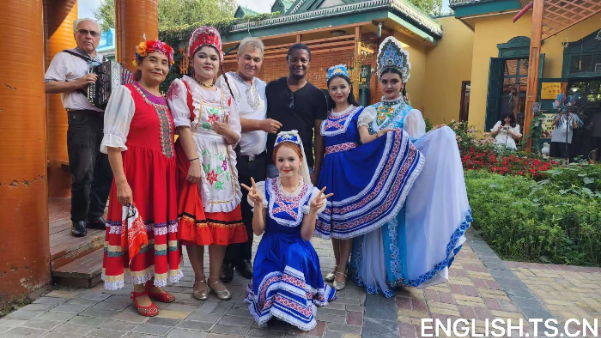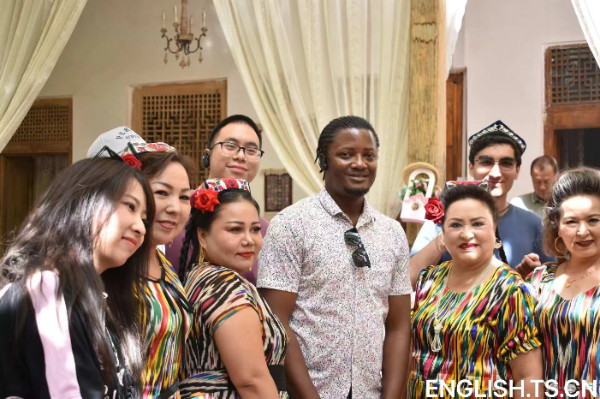The 2024 China Deep Dive program organized by Peking University was a transformative experience that provided a multifaceted understanding of China, particularly its Xinjiang region. The 8-day visit to Xinjiang, which took place from August 20th to 27th, 2024, offered an immersive exploration of the cultural, historical, and economic aspects of Xinjiang, allowing international students like myself to gain a deeper appreciation for the region's role in China's broader narrative.
Historical and Cultural Insights

ABU David Augustine Ked takes a group photo with the locals in northwest China’s Xinjiang Uygur Autonomous Region.
Our exploration began with visits to historical sites such as the Kizil Thousand-Buddha Caves, the Subax Buddhist Temple Ruins, and the Kizilgaha Beacon Tower. These sites highlighted Xinjiang's historical significance along the ancient Silk Road, showcasing its role as a vital hub of trade and cultural exchange between the East and the West. The intricate murals at the Kizil Thousand-Buddha Caves, one of the oldest Buddhist caves in China, offered a visual representation of the region’s rich religious history. Meanwhile, the Subax Buddhist Temple Ruins, a significant Buddhist center, underscored the cultural diffusion that characterized ancient Xinjiang. The Kizilgaha Beacon Tower further emphasized Xinjiang's strategic importance as both a communication and defence outpost during ancient times.
The museum of the Xinjiang Uygur Autonomous Region and the vibrant Xinjiang International Grand Bazaar in Urumqi have provided us with a deeper understanding of the region's diverse ethnic groups and cultural heritage. The museum’s extensive exhibits, ranging from ancient mummies to artifacts representing various dynasties, vividly depict the ethnic and cultural diversity that characterizes Xinjiang. At the Grand Bazaar, the rich Uygur culture comes alive through music, dance, and an array of local handicrafts and delicacies, showcasing the region's distinct identity within the Chinese landscape.

ABU David Augustine Ked with the locals in their home of ethnic characteristics in northwest China’s Xinjiang Uygur Autonomous Region.
Economic Observations and Reflections
As an expert in economic development, I was particularly interested in Xinjiang's evolving role within China's economic landscape. The visit to the China-Kazakhstan Khorgos International Border Cooperation Center was enlightening. This free trade zone, which straddles the border of China and Kazakhstan, exemplifies China’s strategic investments in infrastructure and trade facilitation under the Belt and Road Initiative (BRI).
Additionally, Xinjiang’s potential as a world-class tourist destination is evident. The well-maintained roads, modern accommodations, and comprehensive visitor services, reflect significant investments aimed at boosting the region’s tourism sector, from the serene beauty of Sayram Lake to the cultural richness of Kazanqi folk tourism area. These efforts align with China's broader strategy of fully integrating Xinjiang into its economic framework by leveraging its strategic location and cultural richness to attract both domestic and international tourists.
Reflections on the Forum on China-Africa Cooperation (FOCAC)
The recent Forum on China-Africa Cooperation (FOCAC) has highlighted the deepening ties between China and African countries, including my own country, Sierra Leone. This forum, established on a foundation of mutual respect and shared developmental goals, reaffirms the importance of state-to-state friendship in attaining collective prosperity. In Sierra Leone, the benefits of this cooperation are already visible through infrastructural projects, capacity-building programs, and technical support that directly contribute to our national development aspirations.
From the perspective of an African international student in China, FOCAC also presents immense opportunities for academic exchanges and cultural immersion. Programs like the 2024 China Deep Dive program provide students like myself with exposure to China's development narratives, which encompass economic strategies such as the Belt and Road Initiative (BRI). These experiences enhance our understanding of development models that can be adapted and applied back home in Africa. For African students, this is more than just an academic exercise; it is an opportunity to establish networks, acquire knowledge, and ultimately contribute to the socio-economic advancement of our respective countries.
The 2024 China Deep Dive program offered more than just an educational trip; it provided a journey that broadened my perspectives on the complexities of regional development, cultural diversity, and economic integration in China. The insights gained from visiting historical sites in Xinjiang, understanding its cultural diversity, and observing its economic potential under the BRI have deepened my understanding of China’s multifaceted approach to development. Xinjiang stands as a testament to the dynamic interplay among history, culture, and economic strategy in shaping the future of a region, and it undoubtedly plays a crucial role in China's grand narrative of growth and modernization.
As Africa continues to engage with China through frameworks like FOCAC, the lessons learned from such experiences are invaluable. They not only foster a deeper appreciation of China's developmental journey but also open up avenues for meaningful cooperation that can lead to sustainable development and shared prosperity for both China and African nations.
ABU David Augustine Ked is from Sierra Leone and is currently pursuing his PhD at Peking University.
Producer: Xiao Chunfei
Supervisors: Ding Tao and Jie Wenjin
Planners: Jie Wenjin and Cheng Li
Reviewers: Cheng Li and Hou Weili
Editor: Gvlzar Mijit
Related:
Expat Eyes | An Ethiopian student extends his thanks to China









